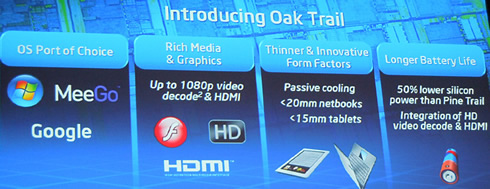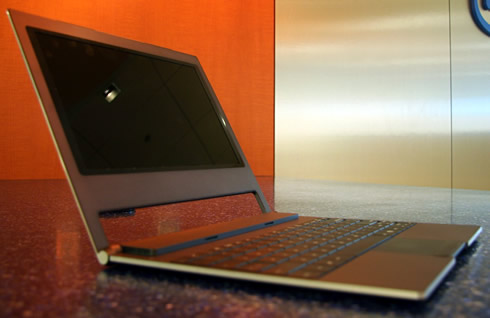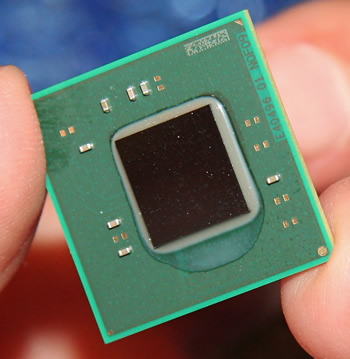
Intel Outlines Atom Processor Plans, Products at Computex
At Computex today, Intel unveiled new products and features based on its low-power Intel Atom processor family, including plans to further differentiate the netbook category and expand into several new market segments beyond its growing PC, laptop and server businesses.
Intel highlighted new product plans for Intel Atom processor family: "Pine Trail" mobile dual-core and "Oak Trail" processors optimized for tablets and netbook form factors. The company also disclosed the razor-thin "Canoe Lake" platform - a futuristic dual-core netbook measuring in at 14 millimeters - the world's thinnest netbook.


During his keynote, David (Dadi) Perlmutter, executive vice president and co-general manager, showed off the world's thinnest netbook running on the upcoming mobile dual-core "Pine Trail." At just 14mm, the razor-thin "Canoe Lake" innovation platform runs cooler and is 50 percent thinner than any other netbook consumers can find on the market today. In addition, Perlmutter showed a range of other Intel Atom-based devices spanning energy efficient blade servers, retailing systems, presentation projectors and multiple tablets.

Citing a million PCs sold a day, Perlmutter also highlighted the momentum around the all new 2010 Intel Core processor family, including Intel Wireless Display and an overview of next-generation Intel Core processors using the Intel microarchitecture codenamed "Sandy Bridge," targeted to be in production late 2010.
"Sandy Bridge" is Intel's next-generation microarchitecture - the next "Tock" after Nehalem. It will be fabricated on Intel's 32nm process technology with second-generation high-K metal gate transistors. In addition to a brand new CPU microarchitecture focused on increased performance and lower power, Sandy Bridge will integrate Intel's next-generation 32nm processor graphics for an increased visual media experience. Sandy Bridge remains on track for production in the fourth quarter, Intel said.
Renee James, senior vice president and general manager of the Software and Services Group at Intel, joined Perlmutter onstage to discuss how software - and software choice - will help drive Intel's vision for Atom and a cross-device experience. This provides consumers consistency and accessibility to their content on a choice of computers and PC-like devices. James also announced that Asus will be the first OEM to ship a pre-installed, customized AppUp client called "asus app store" on netbooks this fall, beginning with Windows and following with MeeGo*-based systems.
Acer CEO Gianfranco Lanci discussed with Perlmutter how future Intel Atom-based netbooks and tablets from Acer, running the MeeGo software platform, will foster an open ecosystem of innovation.
"Acer will be ready with MeeGo-based mobile devices," said Lanci. "MeeGo's open software platform will present our customers with another choice of a friendly, easy-to-use operating system. We are pleased to collaborate with Intel in our continuous drive to provide effortless technologies that empower people at work, home - anytime, anywhere."
 In production now and on shelves before the winter holiday season, mobile dual-core Intel Atom processors will deliver a snappier, more responsive consumer experience in the same compact form factors, and with the same battery life. Intel Atom processors N455 and N475 with DDR3 support for netbooks are available today and D525 and D425 for entry-level desktop PCs are expected to be available on June 21. Available to Intel's customers in early 2011, "Oak Trail" is Intel's upcoming SoC Intel Atom platform optimized for sleek tablet and netbook designs, delivering up to a 50 percent reduction in average power consumption with full HD-video playback and targeting software choice including MeeGo, Windows 7 and Google operating systems.
In production now and on shelves before the winter holiday season, mobile dual-core Intel Atom processors will deliver a snappier, more responsive consumer experience in the same compact form factors, and with the same battery life. Intel Atom processors N455 and N475 with DDR3 support for netbooks are available today and D525 and D425 for entry-level desktop PCs are expected to be available on June 21. Available to Intel's customers in early 2011, "Oak Trail" is Intel's upcoming SoC Intel Atom platform optimized for sleek tablet and netbook designs, delivering up to a 50 percent reduction in average power consumption with full HD-video playback and targeting software choice including MeeGo, Windows 7 and Google operating systems.
Intel also highlighted its next-generation Intel Atom platform targeted at the high-end smartphone, handheld and tablet market segments. Formerly called "Moorestown," the platform brings power reductions for great battery life in small handhelds. The chips also bring high performance to run a complete and growing number of rich media and Internet applications, a choice of software, and the ability to easily multitask across a number of applications, including HD video and multi-point videoconferencing. The platform includes the Intel Atom Processor Z6xx Series (formerly "Lincroft" SoC) and the Intel Platform Controller Hub (PCH) MP20, (formerly "Langwell"). It also features a dedicated Mixed Signal IC (formerly "Briertown") and wireless communications options, including 3G/HSPA.


During his keynote, David (Dadi) Perlmutter, executive vice president and co-general manager, showed off the world's thinnest netbook running on the upcoming mobile dual-core "Pine Trail." At just 14mm, the razor-thin "Canoe Lake" innovation platform runs cooler and is 50 percent thinner than any other netbook consumers can find on the market today. In addition, Perlmutter showed a range of other Intel Atom-based devices spanning energy efficient blade servers, retailing systems, presentation projectors and multiple tablets.

Citing a million PCs sold a day, Perlmutter also highlighted the momentum around the all new 2010 Intel Core processor family, including Intel Wireless Display and an overview of next-generation Intel Core processors using the Intel microarchitecture codenamed "Sandy Bridge," targeted to be in production late 2010.
"Sandy Bridge" is Intel's next-generation microarchitecture - the next "Tock" after Nehalem. It will be fabricated on Intel's 32nm process technology with second-generation high-K metal gate transistors. In addition to a brand new CPU microarchitecture focused on increased performance and lower power, Sandy Bridge will integrate Intel's next-generation 32nm processor graphics for an increased visual media experience. Sandy Bridge remains on track for production in the fourth quarter, Intel said.
Renee James, senior vice president and general manager of the Software and Services Group at Intel, joined Perlmutter onstage to discuss how software - and software choice - will help drive Intel's vision for Atom and a cross-device experience. This provides consumers consistency and accessibility to their content on a choice of computers and PC-like devices. James also announced that Asus will be the first OEM to ship a pre-installed, customized AppUp client called "asus app store" on netbooks this fall, beginning with Windows and following with MeeGo*-based systems.
Acer CEO Gianfranco Lanci discussed with Perlmutter how future Intel Atom-based netbooks and tablets from Acer, running the MeeGo software platform, will foster an open ecosystem of innovation.
"Acer will be ready with MeeGo-based mobile devices," said Lanci. "MeeGo's open software platform will present our customers with another choice of a friendly, easy-to-use operating system. We are pleased to collaborate with Intel in our continuous drive to provide effortless technologies that empower people at work, home - anytime, anywhere."
 In production now and on shelves before the winter holiday season, mobile dual-core Intel Atom processors will deliver a snappier, more responsive consumer experience in the same compact form factors, and with the same battery life. Intel Atom processors N455 and N475 with DDR3 support for netbooks are available today and D525 and D425 for entry-level desktop PCs are expected to be available on June 21. Available to Intel's customers in early 2011, "Oak Trail" is Intel's upcoming SoC Intel Atom platform optimized for sleek tablet and netbook designs, delivering up to a 50 percent reduction in average power consumption with full HD-video playback and targeting software choice including MeeGo, Windows 7 and Google operating systems.
In production now and on shelves before the winter holiday season, mobile dual-core Intel Atom processors will deliver a snappier, more responsive consumer experience in the same compact form factors, and with the same battery life. Intel Atom processors N455 and N475 with DDR3 support for netbooks are available today and D525 and D425 for entry-level desktop PCs are expected to be available on June 21. Available to Intel's customers in early 2011, "Oak Trail" is Intel's upcoming SoC Intel Atom platform optimized for sleek tablet and netbook designs, delivering up to a 50 percent reduction in average power consumption with full HD-video playback and targeting software choice including MeeGo, Windows 7 and Google operating systems.
Intel also highlighted its next-generation Intel Atom platform targeted at the high-end smartphone, handheld and tablet market segments. Formerly called "Moorestown," the platform brings power reductions for great battery life in small handhelds. The chips also bring high performance to run a complete and growing number of rich media and Internet applications, a choice of software, and the ability to easily multitask across a number of applications, including HD video and multi-point videoconferencing. The platform includes the Intel Atom Processor Z6xx Series (formerly "Lincroft" SoC) and the Intel Platform Controller Hub (PCH) MP20, (formerly "Langwell"). It also features a dedicated Mixed Signal IC (formerly "Briertown") and wireless communications options, including 3G/HSPA.





















